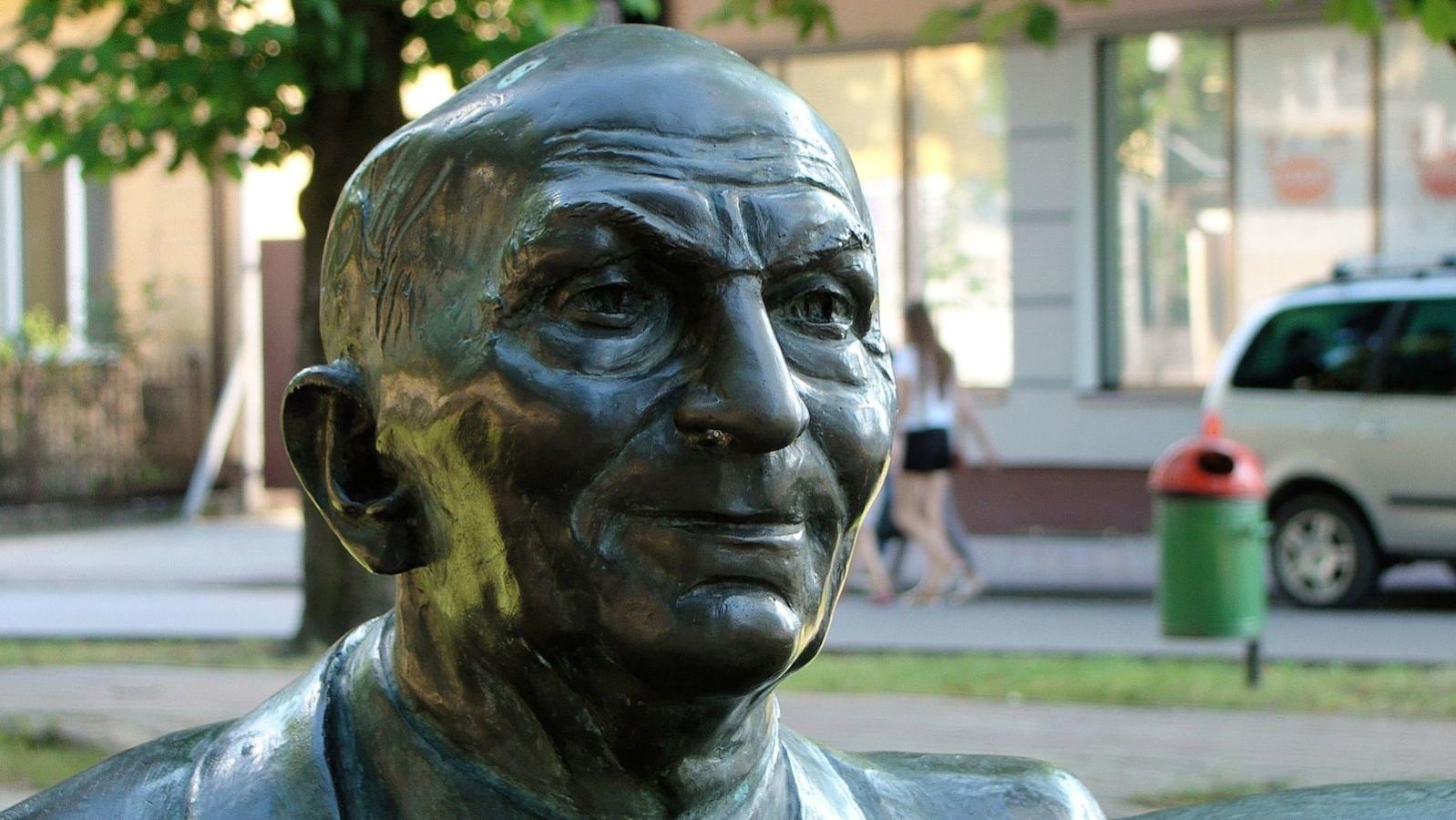Why do Yiddish readers so often hate I.B. Singer’s work, while non-Yiddish readers so often love it? The answer is revealing, and tells us more about what it means to be an American writer than most readers could ever imagine.
Jealousy and Nostalgia
The too-easy answer, of course, is jealousy. Singer was the only Yiddish writer in the thousand-plus years of Yiddish literary history ever to support himself through writing, and his fame couldn’t help but irk Yiddish readers whose favorite writers were ignored while Singer graced the world stage as the “representative” of the Yiddish-speaking world. The almost-too-easy answer is nostalgia.
For Yiddish readers, the world of Jewish life in Eastern Europe was something they knew intimately and whose loss they had suffered wrenchingly, and to many of them, Singer’s work managed to both romanticize and trivialize it at once. Meanwhile, non-Yiddish readers simply saw a writer who they unquestioningly accepted as the mouthpiece of an “authentic” Yiddish-speaking past. But there is a deeper reason why Singer has become uniquely appealing to an audience of readers who never read his work in the original, and it is this reason that makes his fiction both so inherently divisive and so inherently compelling: his artistic approach to the problem of evil.
Demons On the Loose
Singer is often cited–sometimes with contempt, more often now with admiration–for his “amorality.” His characters are frequently demons, whether in personality or in name, sliding easily into acts of crime and passion. No one in his stories is immune to the ravages of pride and lust. Religious and social mores wither at the slightest challenge, and entire communities collapse under the banner of depravity. Goodness goes unrewarded, while the demons always endure.
With your help, My Jewish Learning can provide endless opportunities for learning, connection and discovery.
For Singer’s compromised characters, the only way to escape these forces of corruption is simply to run away–to hide oneself in a closet, like the hero in The Magician of Lublin, or to vanish into the ultra-orthodox neighborhoods of Jerusalem, like the heroes of Shadows on the Hudson or The Penitent, or to disappear, like the protagonists in “Gimpl the Fool” and Enemies, a Love Story, or, like the protagonist of Shosha, to become a Yiddish writer in New York. But even these endings are barely solutions. The demons still survive.
The Anti-Humanist
It’s fair for readers to ask what this might mean. Singer himself liked to hide behind claims of art-for-art’s-sake whenever it proved convenient, proudly declaring that fiction writers have no business making statements while trying to tell a story. And the showmanship that made him famous–his eagerness to play to the crowd, no matter who that crowd might be–makes it hard to pin down what, if anything, the author really believed. But despite his coyness about questions of meaning in his work, one real idea does shine through in his fiction and memoirs over and over again. As he put it in one interview, “The thing I distrust most is humanism.”
Let us consider for a moment the profundity of what that means. Humanism is a belief in the power of humanity to better itself and ultimately redeem itself from all of its flaws. In this view of the world–popular in modern times among those who lack religious faith but yearn for the solidity such faith provides–we the people have the capacity to cure any ills, physical or spiritual, that plague us in our world.
Progress is natural, assumed; our potential is boundless. From such a perspective, there is no such thing as intractable, radical, or irrational evil. Evil acts are simply the result of misunderstandings, or of tragic circumstances whose root causes must be addressed and remedied. People are rationally motivated–or at worst, rationally motivated toward irrational acts–and their motives can be changed. Humanism teaches that we hold in our hands the great gift of hope in one another, the natural power to redeem the world.
This is exactly the belief that Singer’s work rejects. In this sense, he is what we might call a Holocaust writer: not someone who writes about experiences under Nazism (he fled Poland a few years before the war), but someone who in the wake of calamity has refused to let hope triumph over experience–that is, someone who knows, in the most profound sense, about the existence of a force of horror that has no root cause other than radical, irrational, seductive, and astoundingly imaginative evil. (Writing in English, Hannah Arendt saw only evil’s “banality” at Eichmann’s trial, but survivors writing in Yiddish knew the vast powers of creativity required to produce murderous propaganda, the inventiveness of reviving medieval concepts like badges and ghettoes, the imaginative reworkings of language used to camouflage genocide, the expensive and unnecessary artistry of creating imaginary “showers” and other illusions of ongoing life.) And it is true that the vast majority of Singer’s works, even those that take place in an almost mythic pre-Holocaust world, can be read in this shadow.
Tragedy After Tragedy
But for Singer, the rise of Nazism only confirmed what he already believed, a lesson that dated back to every other calamity that befell the Jews before it: the tens of thousands massacred in World War One and its aftermath and in the pogroms of 1905, 1903, 1881, and 1873, to cite just a few links in a chain of horror dating back over a hundred generations. Singer’s first novel, published in 1935, deals with precisely this reality, but with a twist.
Set in the 17th century in the wake of the Chmielnicki massacres in which hundreds of thousands of Jews were murdered in Ukraine, Satan in Goray opens with scenes of brutality taken straight from historical records. Yet the novel’s subject isn’t the massacres, but their aftermath. In the wake of devastation, a Jewish messianic movement sweeps the region (based on the historical false messiah Sabbatai Zevi), and the book’s Jewish community is seduced by demagogues who preach that sin and violence will hasten the redemption. In Singer’s portrayal, the destruction wrought by this false belief is even worse than that of the massacres themselves. The real source of catastrophe, the novel implies, isn’t evil, but hope. The most horrifying ideas can only succeed by building on people’s willingness to succumb to evil as a means to an end, out of hope for a better world.
Different Readers
Yet Singer’s great artistic leap–the one that made his Yiddish readers castigate him, and the one that his non-Yiddish readers never even noticed–was that he domesticated this force of irrational evil, shifting it away from political rallies and angry mobs and shrinking it down into the kitchens and bedrooms of his characters, even though nearly all of his characters were Jews living in spheres so small and politically meaningless (an isolated village, a Jewish market town, a tiny community of refugees) that their minuscule sins could have no effect on the larger world. The demons who haunt his characters wreak their petty havoc on an intimate scale.
For Yiddish readers, haunted by their own involuntary encounters with evil, the artistry of Singer’s fiction was eclipsed by its failure to acknowledge the monstrous proportions of real irrational hatred that dwelled not within their bedrooms, but just outside their doors. But to non-Yiddish readers, for whom an irrational world was a blissfully novel idea, this was simply art, at its most original and daring. His characters were victims not of the horrifying whims of others, but of their own failures and desires, of demons who were private rather than public. Such a world was closer to the one non-Yiddish readers lived in. For them, the problem of evil wasn’t a vast and unexplainable force, spanning centuries and continents, that reliably murdered their children.
Instead it was something private, correctable, “human.” Unlike Yiddish readers, they could simply sit back and enjoy. And of course, it is this very ease of enjoyment–the harmless exoticness, the sense of “authenticity,” and most of all, the portrayal of the most hideous aspects of human nature as being fully the fault of the characters themselves–that makes Singer the consummate American writer, one whose inverted version of morality comes out sounding almost like what American readers value most in fiction and in life: free will, self-reliance, forgiveness, and hope.
Today, we might venture a different sort of hope: that a few readers will read his work and discover, for the first time, the true power of this horrifying writer. And then the real conversation about Isaac Bashevis Singer can begin.
A version of this article appeared on WBUR’s online exhibit for the Isaac Bashevis Singer Centennial.



